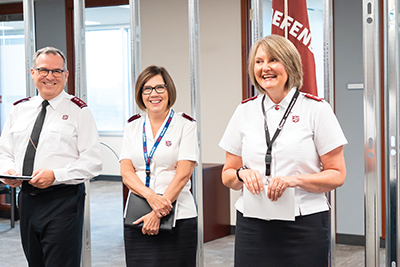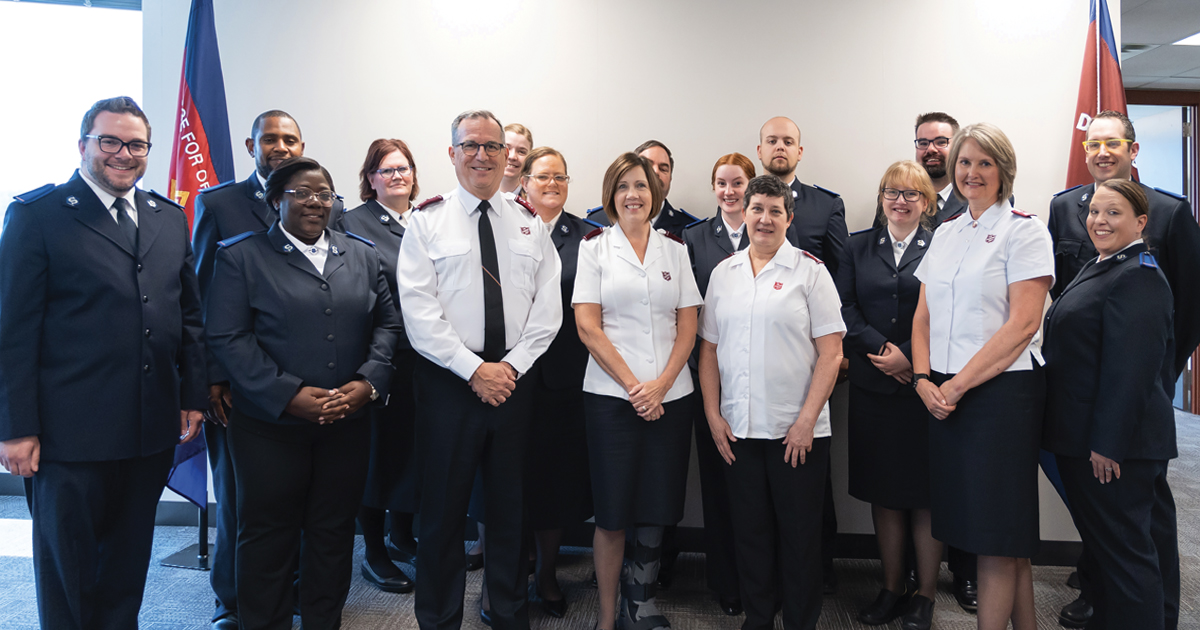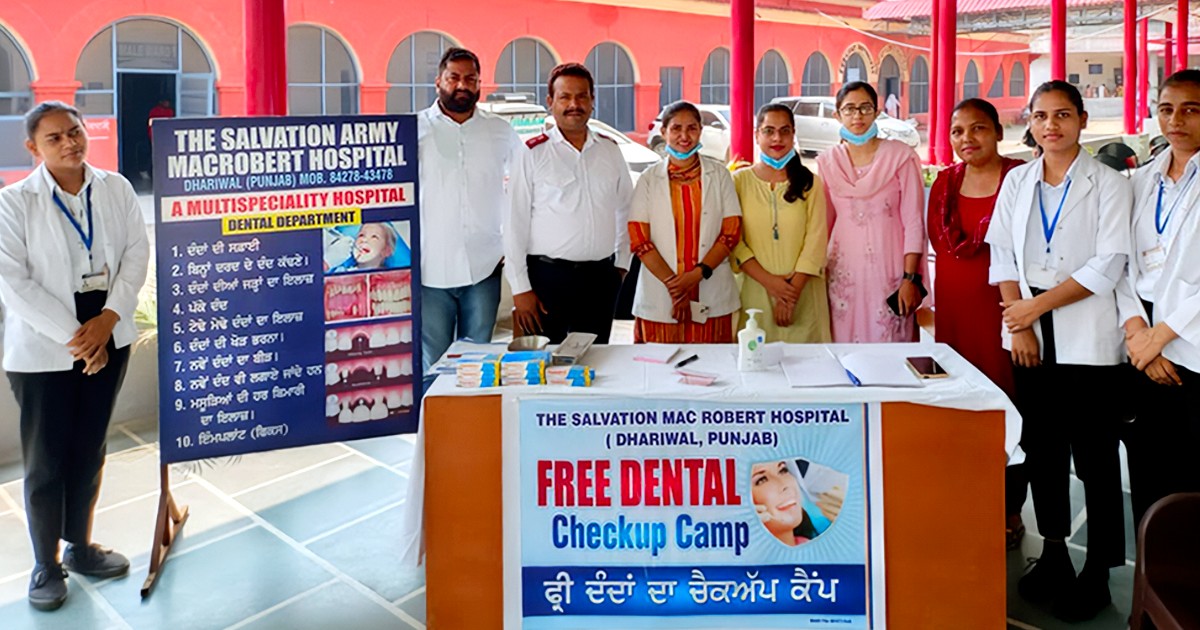(Above) Commissioners Floyd and Tracey Tidd, then territorial leaders, and Colonel Evie Diaz, then chief secretary, and Mjr Deana Zelinsky, training principal, CFOT, with the first group of cadets who will attend CFOT at THQ
Over the past several months, the College for Officer Training (CFOT) has shared plans for its new training and development program with the Canada and Bermuda Territory. Through articles, presentations and virtual townhalls, we’ve outlined the details of the program as well as the philosophy and rationale for these considerable changes in how we prepare future Salvation Army officers for successful ministry in the 21st century.
To summarize the focus of CFOT’s new approach: we are training and supporting cadets and officers in an environment that reflects the realities of life as a Salvation Army officer. By increasing the quality of the field experience, and having cadets work alongside seasoned officers, lieutenants should find the transition to their first appointment easier, setting them up for long-term success.
Hybrid Model
This field-focused training, however, is not the only significant change at CFOT. There’s also the change of location and space to best suit the needs of the ongoing training and development of Salvation Army officers. This change is so much more than a simple “move back to Toronto.” Instead, it’s part of the larger philosophical shift that has driven the programmatic changes. Even when located in Toronto and St. John’s, N.L., prior to the move to Winnipeg in 2006, CFOT had its own space—a separate campus apart from the rest of Army ministry. With the relocation to territorial headquarters (THQ) in Toronto, both CFOT and THQ will be demystified for cadets, officers and employees.
“During the two years of training, cadets will live in the Greater Toronto Area, in proximity to their home-based corps, and will come to CFOT two days a week on Tuesdays and Thursdays. Normally on those days, cadets will be together and engaged in classroom learning; however, the delivery of all CFOT education will be done virtually in some form—some will be in person, with a virtual option for those travelling or for Booth University College faculty; some will be asynchronous online courses, where cadets work independently.
A fully hybrid delivery ensures cadets receive quality education and training while experiencing ministry opportunities at their home-based corps and visiting ministry units throughout the territory without missing class. By prioritizing hybrid delivery for our academic courses, CFOT maintains its relationship with Booth University College. We can also engage Salvation Army-specific instructors from the wider territory.
A Space for Training

As I write this, construction has begun on the classrooms on the fourth floor of THQ, making the space ready for learning and education. The classrooms have been designed to allow cadets to attend academic courses together and equipped with technology to allow the best virtual learning experience for cadets and instructors. This technology will also allow us to engage with auxiliary-captains in the field for their training program.
In addition to classes, these “on-campus days” will comprise meetings, interviews, chapels and additional spiritual life development, as well as THQ departmental workshops and networking opportunities for the cadets with THQ officers and employees. The THQ department workshops and seminars delivered to cadets fall under the mission and ministry formation pillar of training, which introduces and forms the cadet’s understanding of the mission of The Salvation Army and the many expressions of that mission. It’s an essential aspect of the training period.
One of the distinct advantages to having CFOT at THQ is the ability to leverage the knowledge and expertise of Salvation Army personnel. Having cadets physically present at THQ will allow more meaningful engagement with officers, employees and departments, providing vital supplemental contacts and facilitating need-to-know training opportunities in the multitude of ministries.
THQ departments have been an important part of cadet training in the past and will continue to contribute in a more focused and deliberate way to the long-term ministry success of officers. Historically, these workshops have been offered as in-person seminars in the two years of training. The new model of training and development allows for more strategic engagement with Salvation Army content experts to give cadets and lieutenants a foundational understanding of The Salvation Army—policies, ministries, departments—as well as ministry relevant workshops in a meaningful and timely way. Being located at THQ, and through the relationships with THQ departments, CFOT will be able to adjust the focus of seminars to meet the needs of officers and the territory as they arise and as experts have new information and initiatives to share.
Going forward, CFOT will work with the department heads and employees to move some of these introductions and need-to-know workshops to short, asynchronous modules that not only give cadets an introduction to the many ministries of the territory, but which can be revisited later in their own ministry when it’s needed. The classroom technology will assist us in creating quality virtual, asynchronous workshops and seminars. When they’re virtual, these workshops can be attended (and revisited) by lieutenants at a time that makes the most sense.
Ongoing Development
As the CFOT training and development program doesn’t end at commissioning, this new model creates a stronger bridge between THQ departments and lieutenants in appointments. Lieutenants have ongoing development as part of their requirements before they’re promoted to captain. This development includes workshops and seminars that will be most impactful during their time in an appointment rather than the two years as a cadet. For example, we will be engaging the corps mission department to develop a workshop on congregational health in their sixth year, when it’s most applicable to their ministry.
As the fourth floor of THQ takes shape—as classrooms are built and equipment installed, as furniture is unpacked and assembled—CFOT takes shape, and a new era of training and development commences. We are building a space that needs to meet many different needs—a space for academic learning, a space for worship and prayer, a space for fellowship. It’s a space that will bring cadets in the Greater Toronto Area together to learn and share, and a space that connects the larger territory both in person and virtually. We are building a space for the crucial task of training and supporting future Salvation Army officers for the mission of ministering the gospel of Jesus Christ effectively.
Dr. Michael Boyce is the director of program implementation at the College for Officer Training.
This story is from:










Bringing Officer Training back to an area of Canada, where there are more opportunities for Cadets to observe, and participate in, the full scope of Salvation Army involvements, is a step in the right direction. With all due respect to the Winnipeg location, re-locating to the Toronto site makes much more sense. Another concern is the curriculum, I agree somewhat with the earlier comment on the spiritual aspect, don't let the social aspect, overshadow William Boot's directive, to save souls.